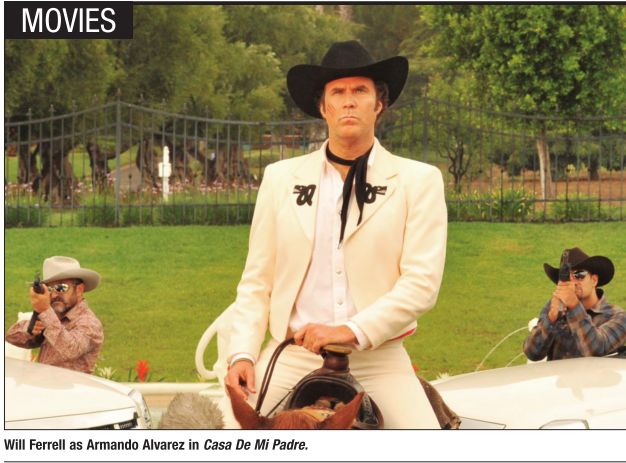
FILM | Chuck Koplinski
They’re called “vanity projects,” films that major stars are allowed to make based on their clout at the box office. Often these films have little appeal to major studios, as they are of such a personal nature to the talent involved that it’s perceived that there’s little widespread appeal. With his films totaling well over $1 billion at the domestic box office alone over the past decade, Will Ferrell has certainly earned the right to make his own vanity project. He does that with Casa De Mi Padre, a curious little comedy that will appeal to a niche audience as well as the actor’s diehard fans, at least those who don’t mind reading subtitles during this 84-minute lark.
Shot on the relatively modest budget of $6 million, the film is a spoof of Mexican telenovelas, soap operas that are popular south of the border and have been the bread and butter of the entertainment industry there for years. Ferrell is Armando, a rather sheltered soul who loves life on the family’s hacienda. That he’s oblivious to the troubles that surround him certainly helps, as his father, Miguel Ernesto (Pedro Armendariz, Jr.), points out “if you were truly smart, you’d realize how dumb you are.” Well, as they say, “ignorance is bliss,” but Armando’s happiness is shattered when he realizes that his home is in danger. His brother Raul (Diego Luna) has been running the ranch and has foolishly gotten involved with some local drug lords. To make matters worse, Raul doesn’t realize that his fiancée Sonia (Genesis Rodriguez) has ties to another drug baron, the Onza (Gael Garcia Bernal) who has his own plans for the Ernestos.
All of this is done in the most overwrought manner imaginable, which is a hallmark not only of the telenovelas but of Ferrell’s humor as well. That all involved are playing this with a straight face and no one mentions that perhaps Armando was adopted is the most obvious and effective of the film’s jokes, but it isn’t the only trick in writer Andrew Steele’s or director Matt Piedmont’s respective bags. While the movie’s absurdist elements are front and center, there is a selfreferential tone that runs throughout that I found more consistently effective.
Ferrell’s earnest delivery of his lines, for which he displays impeccable Spanish, is funny throughout as one gets the impression he’s tackling his own personal version of Hamlet. Equally silly is a traditional musical number, a vision quest that ends up looking like an outtake from an Andy Warhol film and a sex scene that will either leave you in hysterics or scratching your head over its reason for being in the movie. These scenes abut to allusions to spaghetti westerns and the very nature of telenovelas themselves. Extreme close-ups of guns and boots, slow motion pistol fights and amplified sound effects point to Piedmont’s knowledge of the films of Sergio Leone. Moments in which we see characters against obviously cheap backdrops, riding wooden horses, gazing at the Pond of Seven Tears (“the most beautiful place I’ve ever seen.”) which is obviously a murky puddle on a soundstage, reflect a tongue-in-cheek sensibility that you can’t help but giggle at.
On the surface, the film may seem like a one-joke exercise, but there’s much more at play here. Piedmont must be given credit for keeping us on our toes as he relentlessly delivers one gag after another over the course 84 taut minutes. One gag relentlessly leads to the next, so much so that the movie invites repeat viewings to ensure that nothing’s been missed. In the end, one can’t help but wish that all vanity projects were as free of selfimportance as Casa is, as they’d be far more entertaining.
Contact Chuck Koplinski at [email protected].